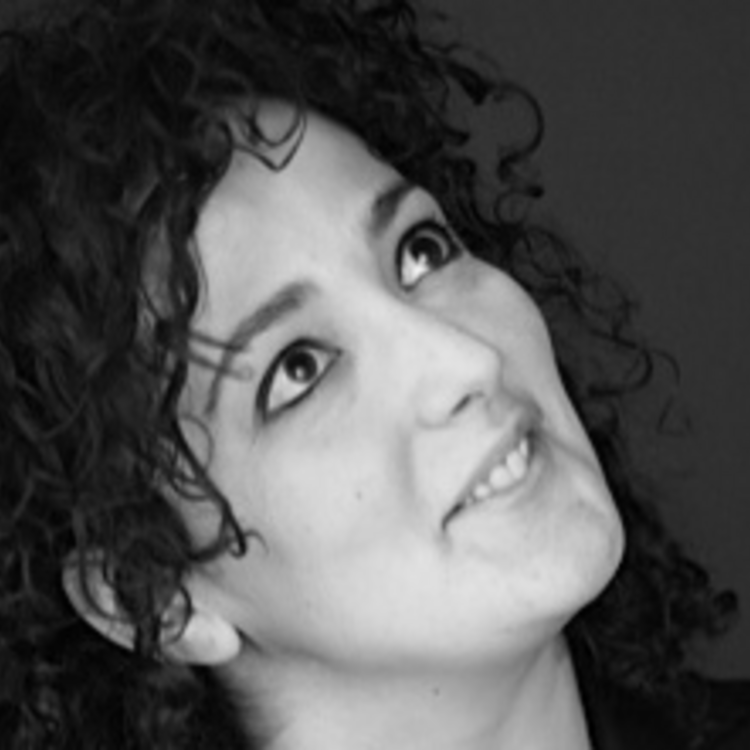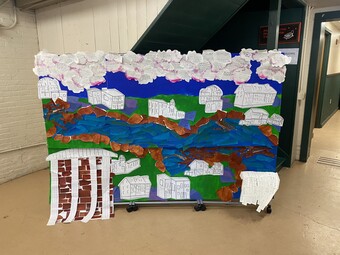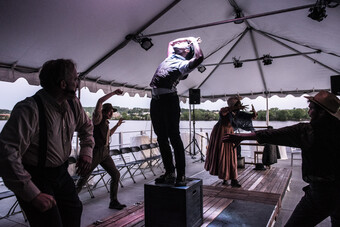On Immersive Theater
The Scent of Imagination
A six-part series on the words, challenges, craft and zeitgeist of the immersive theater movement.
On Immersive Theater: The Senses to Take the Wall Down
Part 3: The Scent of Imagination
New York City in the summer can have an odor that is… unappealing. The ocean shore in the fall, with its salty crisp air can awaken a sense of possibility. A dive bar at 2am can have the smell of loneliness, stale beer, hormones and cleaning solution. So… what if I walk down a Manhattan street in July, walk into a building and catch a whiff of the sandy sea? What if, while sitting by the ocean, the strong smell of whiskey and sweat takes a seat next to me? What if, while at a bar I am overcome by the smell of trash and rot? I might begin to imagine entire stories. I might begin to imagine that the environment I believed I was in has another layer, another experience beyond my assumption.
In 2006, during a production of Faith Healer in Chicago, I remember an extensive design meeting about the smell of our healer’s coat as he re-enters for the final act of the play. What whiskey would we use? How much of an impact would it make on the audience? On the actor? For this production, the audience began in an icy Chicago back alley, walked down the stairs into a dark abyss, and was beckoned by a warm lit doorway in this healer’s room. Upon arrival they found a cozy space to sit on benches. As the piece progressed, they could potentially be healed. But when Frank, the healer, re-entered for his “final act” through the back of the small room, something in him had changed. Something chemically. We soaked his coat in whiskey. Soaked it. We soaked the actor’s beard. As he crossed through them mumbling the incantations of Scottish small towns, the audience felt something amiss. Immediately, before he spoke to them a story was experienced. That story was unique to each audience member. It opened their imagination.
Smell can instigate imagination because it sparks multiple visceral possibilities. Our brain takes in a smell, and connects it to a collage of memories logged from the past. And in that collage of memories the audience member’s imagination is set off. They are creating stories of how much whiskey; where he’s come from; the feel of a wooden bar they sat at while consuming whiskey; their brothers’ favorite bottle; the first time they tasted the sharp sting; etc. etc.
I will return now to a term I introduced at the beginning of this series: open-frame. A term intended to hold the many ways we are all making what is now being lumped into the word “immersive.” As theater makers, we spend most of our time crafting the details of the frame within which the play and the audience exist. However, it is not just the particulars of the frame, but also the potential of the open space that is necessary in defining the organizing principles of this work. These elements are what categorize it as immersive, immersive storytelling, interactive, site-specific, promenade, installation, etc. The relationship between frame and openness is built by the artists’ organizing intention. The frame creates one set of principles within the artist’s intention, and then the open space for both the audience and performers creates an artist-intended sense of freedom. Much like good directors can direct actors with a structure that gives them freedom, this rule still applies in how we direct audience. We create structures that engender thoughtful, crafted freedom. In open-frame work there is so much more potential openness. We don’t have the assumptive behaviors of a proscenium. The frame and simultaneously the choice for where there is openness must be crafted with clear organizing intention. Although much development will be spent on the details of the frame, the openness is where imagination lives.
Smell is a design element that lives more often in the openness. It allows audience to connect their personal experiences and stories to a memory. It may direct an audience in relationship to small details: I would vigorously shut the fish-smelling jeweled box I opened on the desk. Still—it would completely spark my imagination to have discovered a fish smelling jewelry box. It is less likely that that smell will create direction or boundaries for my journey. Smell fills the negative space with food for imagination.
There is a delicate balance between the structure and safety we build, and the imagination we want to inspire. Smell is a powerful part of this work that is hard to manage. Hormones, medication, or other brain chemistry changes can impact scent. Anesthesia can impact your ability to smell for almost a month after. Strong scents can overwhelm and keep you from experiencing anything else. Certain smells can bring a pregnant woman to nausea. Moreover, we often have to be reminded to smell. You’ve heard “stop and smell the roses;” because it is such a powerful experience to really breathe in a scent, we do not engage with it as much in cities or packed spaces as we could. The scent of roses could slow us down and open our minds—an activity we hope for in a theatrical journey, but not day-to-day.
Imagine the scent of your lover: a scent that once was strange and now creates the desire to hold tight to their left-behind t-shirt. What if, somehow a performer had that scent? For most in an audience this performer’s smell is negligible, but for you it could change everything. It could connect you directly to this person in your life and inform the way you desire to interact with the play. You intellectually know that the person who smells this way is not your lover, but your brain immediately tells you to trust this person. That same scent may remind my brain of burnt almonds and an awkward dinner party I was at once: a scent I cannot place, but may make me slightly uncomfortable. Imagination instigated, but not controlled.









Comments
The article is just the start of the conversation—we want to know what you think about this subject, too! HowlRound is a space for knowledge-sharing, and we welcome spirited, thoughtful, and on-topic dialogue. Find our full comments policy here
hello!!
as i read, i asked myself these questions. important to note these questions aren't meant to lead to definitive answers or definitions of smell in open frame, rather asking these questions leads us, the artists, to find & use organizing principles within open frame that tell a story as honestly as possible. * i actually don't think much of what happens between performers & the audience has to do with smell. straight plays, which are the bulk of the dramatic tradition, affect very cerebral & emotional experiences, not primarily sensory experiences. besides us eating food, I don't think our sense of smell is demanded upon as a constant means for new experiences in theatre. That said….
In open frame…..
is there a difference between scent and smell? Scent suggests fragrance (perfume, a manipulated, constructed scent ), smell suggests a raw, black and white sensory experience, (raw chicken rotting, whiskey). Is one preferred over the other because of their makeup, the memories or connections they trigger? Is one more honest than the other? Are "scent & smell" interchangeable?
if scent of imagination is an invisible art form, is it an art form capable of conveying intelligence and complexity the way other sensory experiences do? Beyond the instant reactions in an audience's mind and/or body, is it possible to witness a long-term relationship between scent & the audience, one that allows for analysis and/or transformation? is there freedom to experience beyond, "oh that smells good," "oh that's rank!" "oh I'm nostalgic")
should the organizing principles for scent - whereby a complex relationship forms between the story & the audience - include one scent presented many different ways? i.e. whiskey - should there be the scent of malted grain? of scottish, canadian, civil war or 1920s bathtub whiskey? fresh whiskey as a cork pops open? whiskey & morning breath? whiskey spilled on dirt, skin, concrete, glass, wood? whiskey scent strong, and then faint? do these variations allow for more complexity and analysis? is the whiskey scent used to move a story forward, move the audience forward, change the audience's connection to whiskey scent….. even the most powerful memories of scent can change, like the lover's t-shirt scent, but that said…these questions boil down to the biggie question, what is the artist's intention in open frame and how is it used? how much control do artists possess to affect both wonder-like freedom and the audience's ability to experience complex relationships and transformations.
Other thoughts on the periphery :
Last year an art installation in Chelsea had people blind folded smelling chocolate but tasting peanut butter…and they couldn't tell which they tasted and smelt, the senses bombarded, like learning what chocolate & peanut butter were as if for the first time. What does this inspire in open frame story telling?
How closely linked are scent & taste? Some people have asnomia (can't smell due to injury, blockage, infection). This hits close to home as my boyfriend is an asnomiac. Not that we should re write the open frame principles just for him, but many audience members could suffer from many kinds of "blockage" when it comes to engaging in a sensory experience. In terms of scent, is taste a secondary way to encourage engagement and openness?
Can't wait for more. - Jennifer
I do not believe that the performer's smell is negligible. I think much of the emotional transaction of a live performance, between characters and between actors and audience, is smell. We have a perceptive system that operates below the level of consciousness most of the time, but it is there. Walking into a room, you sense what people in it are feeling: fear, joy, lust, benevolence, sorrow.... walking on stage "prepared" and deeply "into" one of the basic emotions the actor brings an olfactory essence that hits scene partners and the audience before a word is spoken -- and it may contradict the visual image conveyed by costume and previous circumstances. When the audience "gets" it and responds, multiplying the affect, the effect seems magical. But it is our mammalian nature expressed and revealed.
I agree. I dont think it is negligable at all. I DO think we can begin to think about how to craft the layers we design on and with the performer. So much of what I think about is how we reinforce and acknowledge the mammalian nature with as much intention as we do the text or script.
Gorgeous writing. I love the notion of a coat drenched in whiskey coming through the crowd. And "thoughtful, crafted freedom" is a very appealing concept. Thanks for the inspiration.
Thank you Cheryl!